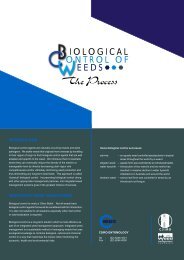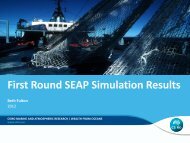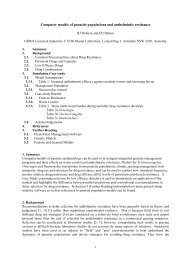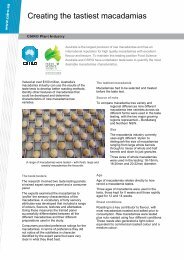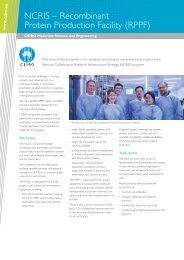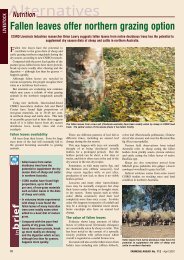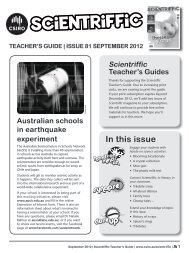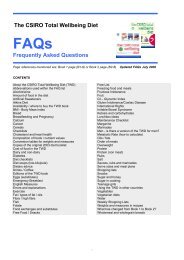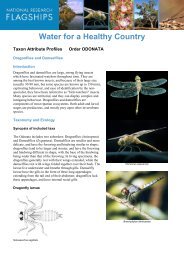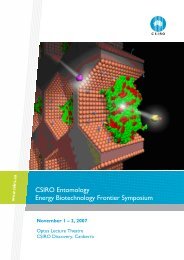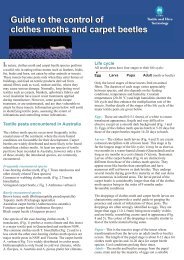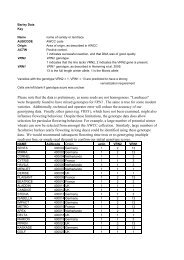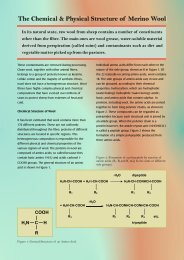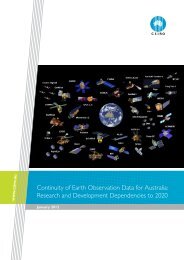WfHC - cover page (not to be used with pre-printed report ... - CSIRO
WfHC - cover page (not to be used with pre-printed report ... - CSIRO
WfHC - cover page (not to be used with pre-printed report ... - CSIRO
You also want an ePaper? Increase the reach of your titles
YUMPU automatically turns print PDFs into web optimized ePapers that Google loves.
Ivan Jimmy: They get bogged in the muddy water, the swamps and the little creeks, and<br />
then they all die away. In the days we worked there, we go around and check every<br />
waterhole and little creek. With the car from the station, and pull them all out. They get<br />
bloated and they drink <strong>to</strong>o much water. Then they won‟t get out of the bog.<br />
Marcus Bar<strong>be</strong>r: So you are worried that if there is <strong>not</strong> enough water, then the bogs happen<br />
and the cows get caught?<br />
Ivan Jimmy: Mmm.<br />
Marcus Bar<strong>be</strong>r: What about the bush animals? Does the changing rain affect the goannas?<br />
Ivan Jimmy: Yes. They need the rain so that they can get, so that they can have bush feed,<br />
and eat and feed what they want grow, and <strong>be</strong> a big goanna, and breed, <strong>with</strong> the female<br />
partner water goanna. Because they need food <strong>to</strong>o. It‟s a cycle, for each animal, just like<br />
us, we can hunt them and kill them and they got <strong>to</strong> look for their food and eat their food.<br />
And then we come along and kill them and eat them.<br />
Water is clearly a crucial fac<strong>to</strong>r in the abundance and distribution of animals in the<br />
landscape. Abundant water can drive the dispersal of pigs but also concentrate the <strong>pre</strong>sence<br />
of other large introduced animals such as cattle and horses in higher elevation areas. The<br />
degree of impact that changing flow patterns have on animal distributions depends on the<br />
species, but what is also suggested by the material above is that local native animals are<br />
less affected by regular changes in flow regimes than are the hard-hoofed introduced<br />
animals. The above comments also emphasise terrestrial animals. Given the significant<br />
ecological roles played by aquatic animals and their value <strong>to</strong> human <strong>be</strong>ings, the impact of the<br />
flow regime on animals like fish, freshwater crocodile and turtles is an important issue <strong>to</strong><br />
address. Key questions include the dispersal of aquatic species during flood periods, the<br />
duration of connectivity <strong>be</strong>tween major permanent pools, and mapping the <strong>pre</strong>sence or<br />
absence of particular species across the water bodies of the station.<br />
2.6.2 Cattle mustering patterns<br />
The establishment of Oriners cattle infrastructure and the changing patterns of ownership in<br />
the stations surrounding it were important in shaping the movement of cattle, and therefore of<br />
the cattlemen, through the area. In the early decades, Oriners was mustered and managed<br />
from Koolatah:<br />
Marcus Bar<strong>be</strong>r: So, when you got those cattle, did you take them back <strong>to</strong> Oriners<br />
[homestead]?<br />
Edwin David: Yeah they got the paddock there.<br />
Marcus Bar<strong>be</strong>r: Where did you take them from there? To Dixie or Koolatah?<br />
Edwin David: We <strong>used</strong> <strong>to</strong> bring them back down <strong>to</strong> Koolatah.<br />
Marcus Bar<strong>be</strong>r: Did you ever take them <strong>to</strong> Dixie?<br />
Edwin David: No, <strong>not</strong> there. We never <strong>used</strong> <strong>to</strong> take them up there much. Take them back at<br />
Koolatah. We <strong>used</strong> <strong>to</strong> camp near Jewfish.<br />
Marcus Bar<strong>be</strong>r: Is Mosqui<strong>to</strong> down that way <strong>to</strong>o?<br />
Edwin David: Yeah.<br />
Marcus Bar<strong>be</strong>r: So when you were taking those cows back <strong>to</strong> Koolatah, was that still<br />
raining then?<br />
Edwin David: Oh, it was just getting a bit, a bit after the wet then see. The rain just settle<br />
down. We <strong>used</strong> <strong>to</strong> take them back <strong>to</strong> Koolatah. When he get a bit dry, we <strong>used</strong> <strong>to</strong> do<br />
mustering there. We <strong>used</strong> <strong>to</strong> go out there, camp out there, hobble the horse, go out there,<br />
Working Knowledge at Oriners Station, Cape York<br />
105



